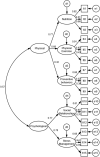Lifestyle choices of Brazilian college students
- PMID: 33083105
- PMCID: PMC7547619
- DOI: 10.7717/peerj.9830
Lifestyle choices of Brazilian college students
Abstract
Background: Lifestyle choices reflect the beliefs that individuals attribute to aspects of life. This construct can be assessed with the Individual Lifestyle Profile (PEVI) questionnaire, which measures elements of Nutrition, Physical Activity, Preventive Behaviors, Social Relationships and Stress Management.
Objective: The objective of this study was to estimate the psychometric properties of the PEVI applied to a sample of Brazilian university students, identifying the prevalence of each lifestyle component according to participants' age, sex, weight status, course area/field and economic stratum and to estimate the contribution of these characteristics on physical and psychological lifestyle.
Methods: The PEVI data was analyzed by confirmatory factor analysis, using the indexes chi-square per degrees of freedom ratio (χ2/df), Comparative Fit Index (CFI), Tucker-Lewis Index (TLI) and Root Mean Square Error of Approximation (RMSEA). First-order and second-order models (physical and psychological lifestyle) were tested. Prevalences of lifestyle components were calculated and compared by participants' age, sex, weight status, course area/field and economic stratum. A hypothetical causal structural model was elaborated to investigate the impact of sample characteristics on physical and psychological lifestyles. This model was evaluated considering the global fit to the data (χ2/df, CFI, TLI and RMSEA) and the hypothetical causal trajectories (β) (α = 5%).
Results: A sample of 1,303 students was used. The mean age was 20.9 (standard deviation = 2.8) years, 66.8% of participants were females, 63.4% had weights in the normal range and 73.7% were students of the social and exact sciences. The PEVI data showed an adequate fit for both the first- (χ2/df = 2.03, CFI = 0.98; TLI = 0.97; RMSEA = 0.04) and second-order (χ2/df = 2.25; CFI = 0.97; TLI = 0.97; RMSEA = 0.04) models. There was a higher prevalence of unfavorable physical and psychological lifestyle choices among females, among underweight and obese individuals, in older students and in those with lower economic strata. Moreover, negative behaviors in physical lifestyle were more prevalent in students from human/social/exact sciences and worse psychological lifestyle was observed among health sciences students. These results were confirmed by a structural model.
Conclusion: The PEVI data presented validity and reliability. Negative lifestyle choices had high prevalence among students. Moreover, individual characteristics had different impact on physical and psychological lifestyle choices.
Keywords: Epidemiology; Health promotion; Lifestyle; Psychometrics; Students.
© 2020 Martins et al.
Conflict of interest statement
The authors declare that they have no competing interests.
Figures
References
-
- Abdel-Megeid FY, Abdelkarem HM, El-Fetouh AM. Unhealthy nutritional habits in university students are a risk factor for cardiovascular diseases. Saudi Medical Journal. 2011;32(6):621–627. - PubMed
-
- Aceijas C, Waldhäusl S, Lambert N, Cassar S, Bello-Corassa R. Determinants of health-related lifestyles among university students. Perspectives in Public Health. 2016;20(10):1–10. - PubMed
-
- Alvarenga M, Koritar P. Atitude e comportamento alimentar—determinantes de escolhas e consumo. In: Alvarenga M, Figueiredo M, Timerman F, Antonaccio C, editors. Nutrição Comportamental. 1. São Paulo: Manole; 2015. p. 64.
-
- Anastasi A, Urbina S. Psychological testing. Seventh Edition. Upper Saddle River: Prentice Hall/Pearson Education; 1997.
-
- Añez CRR, Reis RS, Petroski EL. Brazilian version of a lifestyle questionnaire: translation and validation for young adults. Arquivos Brasileiros de Cardiologia. 2008;91(2):92–98. - PubMed
LinkOut - more resources
Full Text Sources
Miscellaneous



